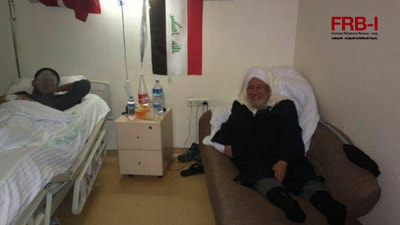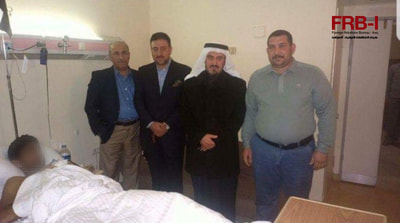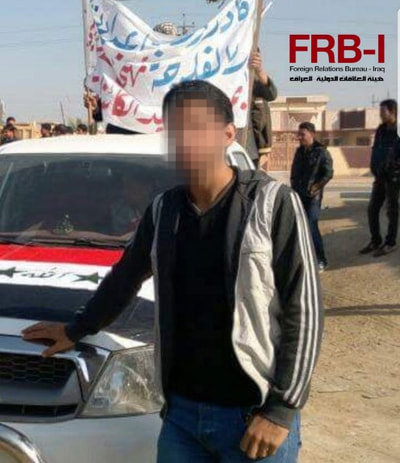Another testimony from Iraq’s blemished past is brought to you by FRB — this time from Fallujah, during its own ‘Arab-Spring’ moment between late 2012 and 2013.
The government’s heavy handed response to Fallujah’s own Arab Spring rising — one year ahead of the Islamic State’s debut in 2013 — left behind a permanent blood stain on the country’s historical record.
West of Baghdad, the men of Fallujah rallied in revulsion of political malpractices and sectarian provocation that former premier, Nouri al Maliki used to keep (at any cost) his seat in power.
Fallujah was not the only province to rise up. Joining them were delegations from surrounding cities — armed with slogans and demands favouring the dissolution of Iraq’s US-imported, sectarian structures of power.
The government’s heavy handed response to Fallujah’s own Arab Spring rising — one year ahead of the Islamic State’s debut in 2013 — left behind a permanent blood stain on the country’s historical record.
West of Baghdad, the men of Fallujah rallied in revulsion of political malpractices and sectarian provocation that former premier, Nouri al Maliki used to keep (at any cost) his seat in power.
Fallujah was not the only province to rise up. Joining them were delegations from surrounding cities — armed with slogans and demands favouring the dissolution of Iraq’s US-imported, sectarian structures of power.
Maliki’s response was mercilessly, unleashing brute force on unarmed protesters in an effort to beat men into silence. This was the fate that awaited one of the protest organizers in Fallujah, Hamza Khairulla al Rawi.
On his way to Baghdad, Rawi was stopped at al Suqour checkpoint by Maliki’s men. His charge was political involvement in the latest cycle of peaceful demonstrations.
By no mistake, multiple shots were fired at his abdomen, leaving the young student hospitalised after suffering ureteric rupture and other related injuries. Due to the severity of the attack, doctors were persuaded to seek medical assistance in neighbouring Istanbul, to facilitate the young man’s recovery.
The sides of his hospital bed were never unoccupied. Prominent Sunni figures from across Anbar filled Al Rawi’s ward to pay their dues.
On his way to Baghdad, Rawi was stopped at al Suqour checkpoint by Maliki’s men. His charge was political involvement in the latest cycle of peaceful demonstrations.
By no mistake, multiple shots were fired at his abdomen, leaving the young student hospitalised after suffering ureteric rupture and other related injuries. Due to the severity of the attack, doctors were persuaded to seek medical assistance in neighbouring Istanbul, to facilitate the young man’s recovery.
The sides of his hospital bed were never unoccupied. Prominent Sunni figures from across Anbar filled Al Rawi’s ward to pay their dues.
Sheikh Jamal al Kubaisi, former secretary general of Iraq’s Islamic Party (IPI), Tariq al Hashimi and Sunni businessman-turned leader of Iraq’s latest Sunni bloc — The Arab Project — Khamis Khanjar, among others, visited Rawi during his recovery.
The young activist survived the assassination, and now resides in Finland as a political refugee — a price he may continue to pay for, in exchange of a life free from persecution.
His scars live to tell the tale, but Fallujah is no longer a safe dwelling that Rawi and others activists can call home. A total of 13 men were shot dead, and 39 others were injured.
Many of the leading proponents of Fallujah’s spring and sit-in movement, have since been hunted down, incarcerated and murdered. Those killed included Rawi’s close colleagues, whose dead corpses had to be identified by parents ill prepared for the news that awaited them.
The young activist survived the assassination, and now resides in Finland as a political refugee — a price he may continue to pay for, in exchange of a life free from persecution.
His scars live to tell the tale, but Fallujah is no longer a safe dwelling that Rawi and others activists can call home. A total of 13 men were shot dead, and 39 others were injured.
Many of the leading proponents of Fallujah’s spring and sit-in movement, have since been hunted down, incarcerated and murdered. Those killed included Rawi’s close colleagues, whose dead corpses had to be identified by parents ill prepared for the news that awaited them.




 RSS Feed
RSS Feed